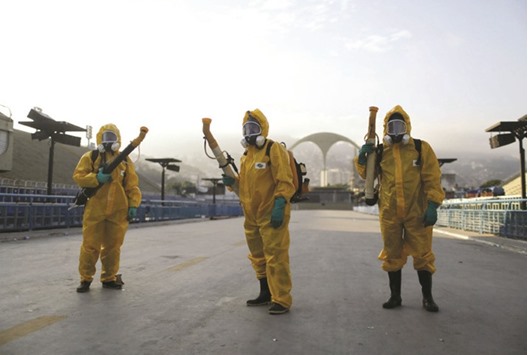
Municipal workers prepare to spray insecticide at Sambodrome in Rio de Janeiro, Brazil, yesterday.
Brazil is mobilising more than 200,000 troops to go “house to house” in the battle against Zika-carrying mosquitoes, blamed for causing horrific birth defects in a major regional health scare, a report said.
Soldiers will fan out to homes across Brazil distributing leaflets and dispensing advice, Health Minister Marcelo Castro was quoted as saying by the newspaper O Globo, signalling a major ramping up of efforts against the Zika virus.
Castro said that the government, under growing pressure to deal with the crisis, will also hand out repellent to at least 400,000 pregnant women on social welfare.
Zika is linked to serious birth defects, including microcephaly, in which babies born to women infected during pregnancy have abnormally small heads.
A surge in incidents across Latin America, notably in Brazil, has prompted the US and other governments to warn pregnant women against travelling to the region - an alarming prospect for Brazil as it gears up to welcome the Olympics to Rio de Janeiro in August.
Unlike some other international health scares, the Zika virus is not spread person to person. And for most people who get infected, the flu-like symptoms will clear up in about a week.
But the specific threat to pregnant women and their fetuses, and the seeming impossibility of avoiding mosquitoes in tropical countries, has given this crisis extra bite.
Brazil has recorded at least 3,893 microcephaly cases since an unusual spike in the rare condition was noticed in the country’s northeast in October. Previously an annual average of 160 cases was the norm.
And short of not getting pregnant, there is no foolproof method for avoiding risk.
Castro said last week that the Aedes aegypti mosquito, which carries Zika and also dengue fever and the chikungunya virus, was gaining momentum.
Meanwhile Rio de Janeiro sent fumigators yesterday into the city’s carnival stadium, which will also be used for Olympic archery in August, to combat an outbreak of the Zika virus.
The sight of men in protective overalls and goggles spraying the famous Sambodrome facility was a grim confirmation of just how worried Brazil is becoming that the virus scare will tarnish both the carnival and upcoming Summer Olympics.
The Sambodrome will host Rio’s elaborate annual parades on February 7 and 8, and also the archery contest during the Games.
“The concern is very great in all of Rio because it’s a city for mega events. During the carnival there’ll be crowds of people from different parts of the world and Brazil, which will help the virus get in,” said Marcos Vinicius Ferreira, spokesman for Rio’s health department.
“The main thing is to get rid of mosquito breeding sites,” he said.
